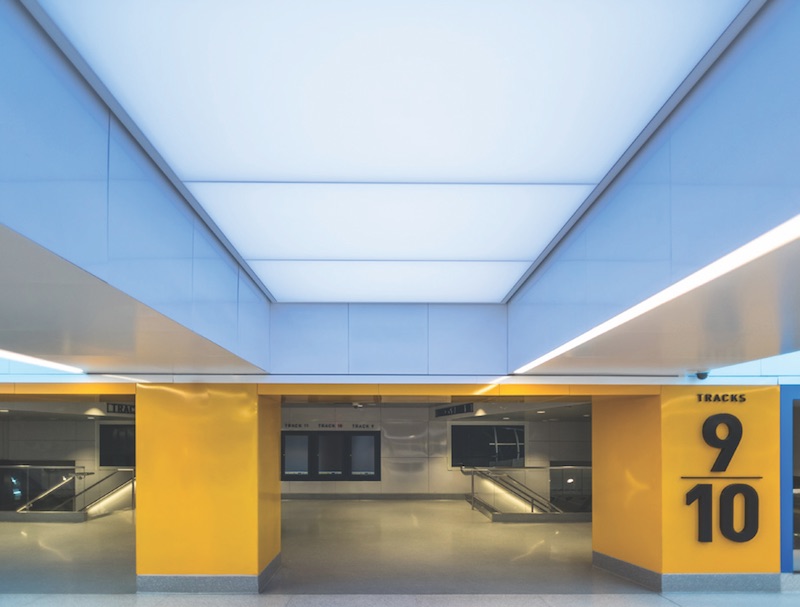1. Composite slate roofing
Davinci Roofscapes
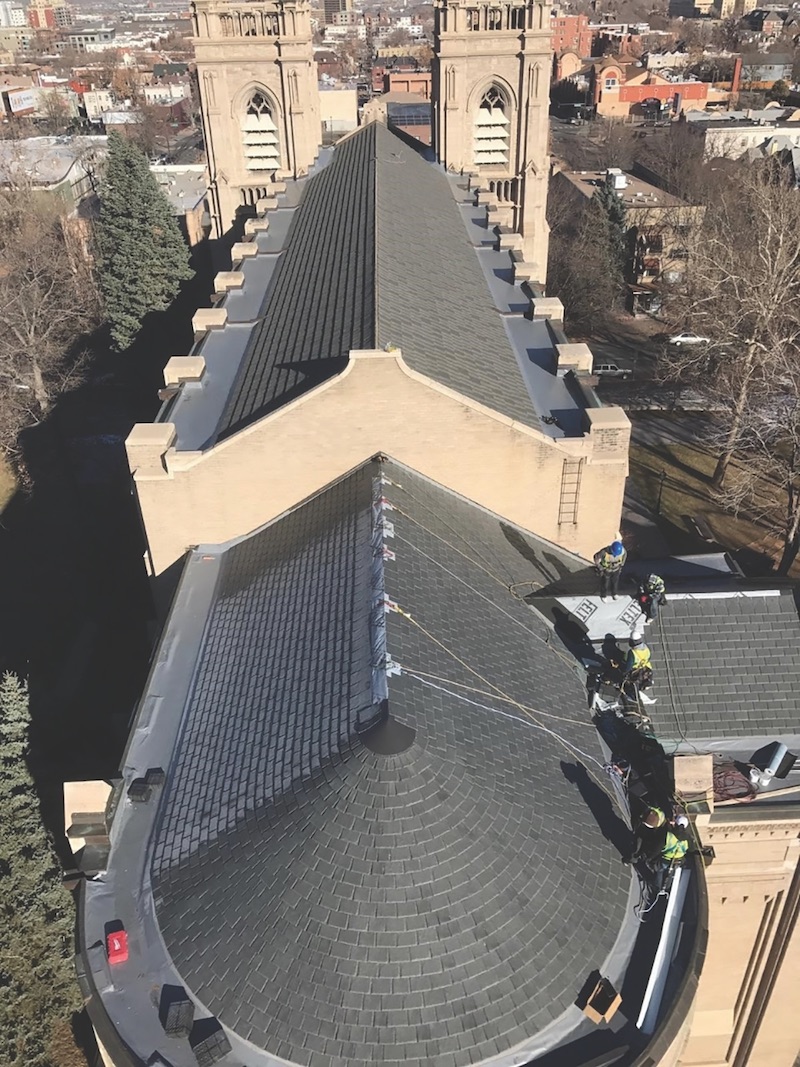
Project: Saint John’s Cathedral, Denver. Problem: A new roof was needed to protect the historic structure from the rigors of the Rocky Mountain region’s severe weather. Solution: DaVinci Roofscapes single-width composite tiles were used to protect the 90-foot-tall church without compromising its aesthetics. The installer used 39 squares of Slate Gray, 55 in a canyon color, and 151 in the European blend. On the team: Horn Brothers Roofing.
2. Pentaglas Panels
Kingspan light + air
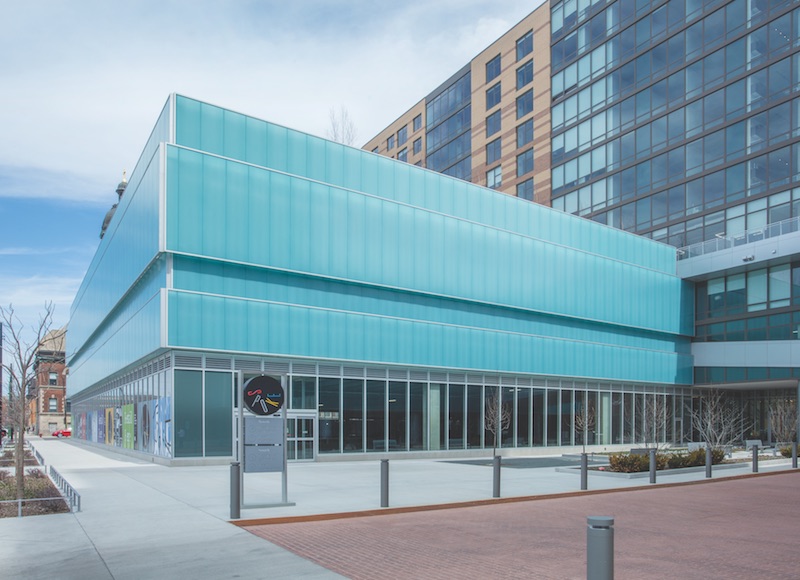
Project: Spoke apartment parking garage, Chicago. Problem: The parking garage was a concrete monstrosity that needed to find a balance between ventilating airborne contaminants and achieving a pleasing look. Solution: The garage was clad with 17,430 sf of “floating” Pentaglas cladding panels to improve the aesthetics and allow air to move into and around the garage while exhausting CO2. On the team: FitzGerald Associates Architects.
3. Illuminated Ceiling
Sefar Architecture
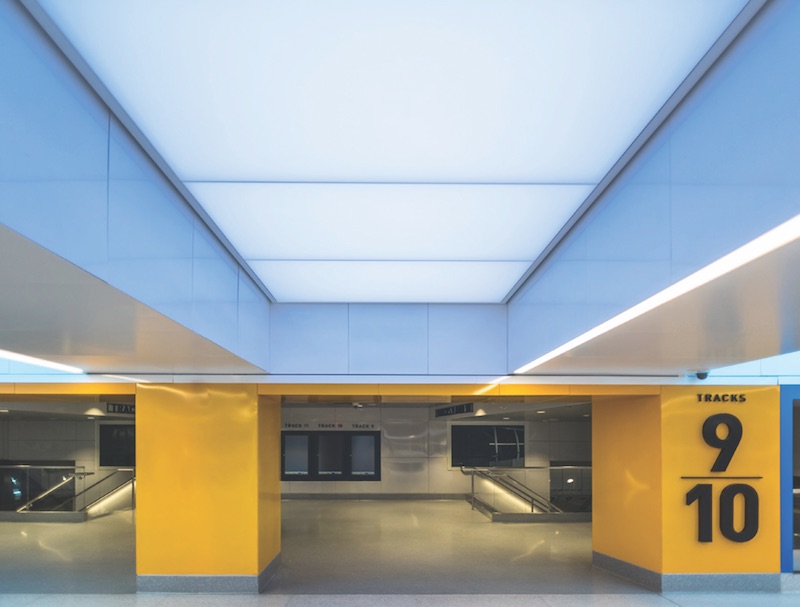
Project: Moynihan Train Station, New York. Problem: The architects wanted a ceiling system to illuminate an underground walkway. Solution: The SEFAR Architecture Lightframe ceiling system, a modular system. Two layers of IA-85-OP fabric were used with the system to allow for even light distribution. In addition to uniformly lighting the space, the modules have an NRC value of 0.90 to reduce noise in the terminal hallways. On the team: Skidmore, Owings & Merrill.
4. Standing Railing
Trex Commercial Products
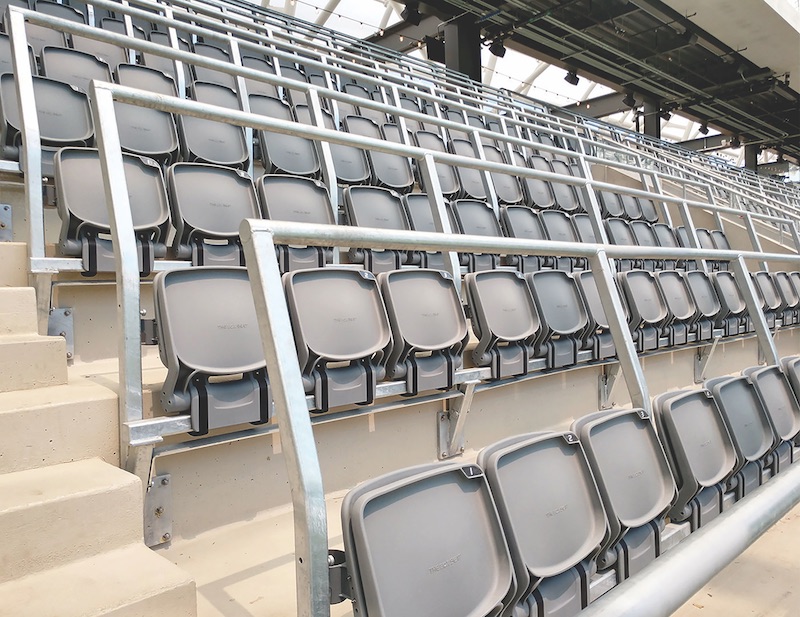
Project: Banc of California Stadium, Los Angeles. Problem: The first standing supporter section in a U.S. stadium needed a custom railing to safely allow fans to watch the match from the unprecedented pitch of 34 degrees. Solution: A custom standing railing with integrated seating. The riser-mounted metal-railing frame angles back to create a comfortable lean rail for standing supporters. On the team: Gensler (architect), PCL Contracting (GC).
5. Digitally Printed glass
Viracon
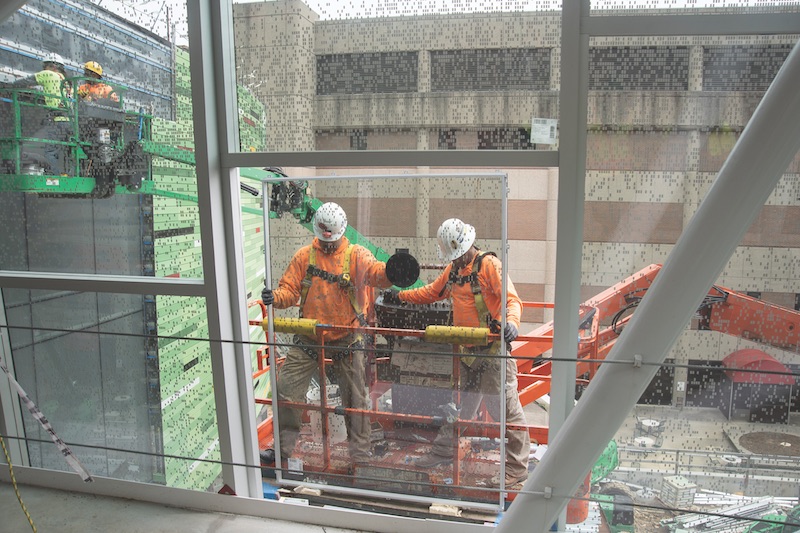
Project: The Novak Center for Children’s Health at the University of Louisville’s Health Sciences Center. Problem: The university wanted the connection between the Novak Center and the Chestnut Street Garage to be an airy, naturally lit pedestrian bridge. Solution: The third-floor bridge used 138 rectangular pieces of Digital Distinctions glass by Viracon, each digitally printed with a custom block pattern. On the team: Messer Construction (CM), Koch Corp. of Louisville (installer).
6. Zinc Wall Panels
Dri-Design
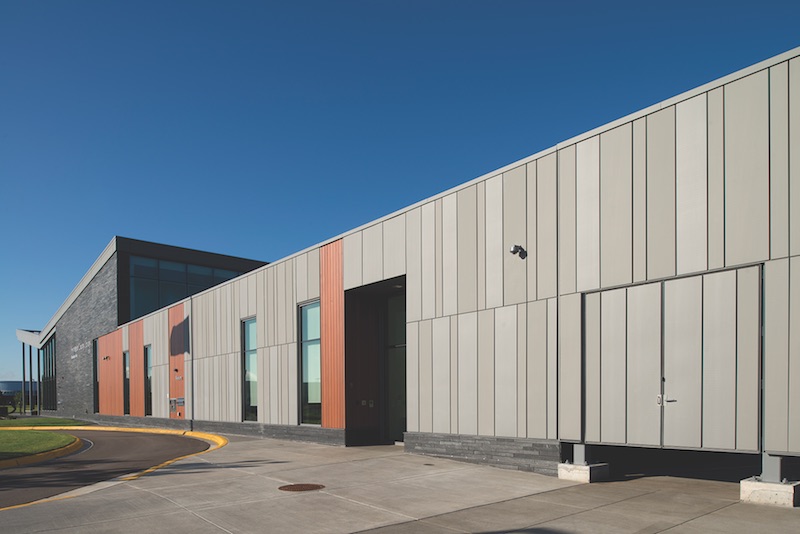
Project: Hennepin County Library, Minneapolis. Problem: HGA needed a metal panel that was efficient in terms of raw material, size, panel span, framing, and manufacturing waste—without compromising design. Solution: Dri-Design VMZINC Wall Panels were chosen for their long life span. They don’t use tapes, sealants, or gaskets, which eliminates the streaking and staining associated with such products. They forgo a plastic core, making them noncombustible. On the team: HGA (architect), Progressive Building Systems (panel installation).
Related Stories
| Aug 11, 2010
ASHRAE Receives NIST Grant to Study IAQ in Retail Stores
The American Society of Heating Refrigeration and Air-conditioning Engineers (ASHRAE) has been awarded $1.5 million dollars in grant money from the National Institute of Standards and Technology (NIST) to conduct a three-year research project on ventilation and indoor air quality in retail stores.
| Aug 11, 2010
Georgia Tech requires LEED Gold for all new buildings and renovations
The Georgia Institute of Technology in Atlanta is currently updating its facilities design standards to meet LEED (Leadership in Energy and Environmental Design) Gold as set by the U.S. Green Building Council. Energy Ace, Inc., an Atlanta-based sustainability consulting firm is assisting Georgia Tech in preparing the Standards upgrade.
| Aug 11, 2010
UC Merced researchers receive $568,000 grant to develop solar sensing, tracking system
Alberto Cerpa, an engineering professor at the University of California Merced, has received a $568,202 grant from the National Science Foundation to develop a system that will measure and track the amount of sunlight that reaches ground level where photovoltaic panels and solar concentrators used in solar energy systems collect light and heat to turn into electricity.
| Aug 11, 2010
Mark McCracken named chair-elect of USGBC Board of Directors
Mark MacCracken, CEO of CALMAC, Inc., a producer of cold storage energy solutions, has been selected as Chair-elect of the U.S. Green Building Council (USGBC) Board of Directors for the 2010 calendar year. The USGBC Board of Directors is responsible for articulating and upholding the vision, values and mission of USGBC. In 2009, MacCracken was elected to serve a second 3-year term as Director in the Energy Services Seat.
| Aug 11, 2010
Only four out of 337 cities added construction jobs in 2009
Construction employment grew in only four out of 337 metropolitan areas in 2009 as spending on construction projects dropped by $100 billion in December to a six-year low of $903 billion, according to a new analysis by the Associated General Contractors of America of federal figures released recently.
| Aug 11, 2010
Zero Energy Buildings + Homes' Call for Editorial Contributions & Contributors
BD+C will publish its 8th Annual White Paper on Green Buildings, "Zero Energy Buildings + Homes," in November-and you can contribute to it. We're looking for highly qualified experts (or teams of experts) to write individual chapters (about 2,000-3,000 words). We've started the outline here, but we'd like your suggestions about additional chapters. What did we miss? Help us shape this important report.
| Aug 11, 2010
Blue ribbon panel unveils recommendations for NYC's green building codes
In response to City's request, the task force unveils more than 100 recommendations for greening NYC buildings, in most sophisticated analysis ever conducted by a municipality
| Aug 11, 2010
ULI: 'Old Normal' will not be a part of the housing recovery
As the U.S. economy recovers, emerging trends in demographics and consumer behavior will become major drivers of new housing opportunities, resulting in a residential market vastly different from the one that existed prior to the recession, according to Housing in America: The Next Decade, a new research paper authored by John K. McIlwain, senior resident fellow, Urban Land Institute/J. Ronald Terwilliger Chair for Housing.
| Aug 11, 2010
Billings increase less than a point in December, still in negative territory
The American Institute of Architects reported the December Architecture Billings Index rating was 43.4, up slightly from 42.8 in November. The score indicates a continued decline in demand for design services (any score above 50 indicates an increase in billings). AIA Chief Economist Kermit Baker said the inability to get financing is still the main roadblock to recovery.
| Aug 11, 2010
FMI: 2009 was the bottom for residential, non-residential construction still in freefall
While 2009 was likely the bottom in terms of percentage decline, 2010 will be the bottom in terms of dollar volume for non-residential construction, according to market analysts at consulting firm FMI. Residential construction is expected to begin recovering in 2010. The economy may show some signs of improving, but it is just the beginning of the downfall for nonresidential construction.


